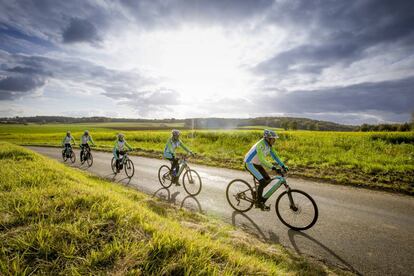Pedaling our way to the summit on climate change
Planeta Futuro joins the ride from Paris to Bonn with the Moving for Climate Now peloton

To make up for the carbon footprint left by our flight to Paris, we get on our bikes and pedal like crazy in the direction of the UN Conference on Climate Change (COP23) in Bonn.
Journalists with Planeta Futuro cycled for three days with the Moving for Climate Now team, organized by the UN Global Compact Network Spain in conjunction with Spanish energy giant Iberdrola. We are suffering alongside representatives of companies and organizations from the worlds of sport and showbusiness in a seven-stage journey to hand over a manifesto to the summit and flag up the need to “move” to save the planet.
We have to admit to cheating a little though, as our bikes are electric and when the going gets tough, particularly at the end of the day, an extra push can come in handy. But it’s also worth noting that an electric bike is not the same as a motorbike – it does require a certain physical effort from the rider. And while most of the daily 100 kilometers is flat and the weather mild, the early morning fog and cold can be challenging to say the least.
The attitude of the US president has been discouraging and people who are not properly informed might think that this summit is pointless, but it is not the case
Isabel Garro, director of UN Global Compact Network Spain
The peloton has around a dozen cyclists pedaling in each stage of the trip, with an additional security and logistical team. The plan was to arrive in Bonn on November 5, on the eve of the summit’s inauguration, having whistled through more than 800 kilometers.
But why cycle from Paris to Bonn in an age of low-cost air travel? According to Carlos Sallé, director of energy policy and climate change at Iberdrola, the ride embodies the spirit of the Sustainable Development Objectives (ODS) 17, which is to create partnerships and increase awareness of the urgent need to act now against climate change (ODS 13). “We need scalable solutions and this can only be achieved if everyone is on board,” he says after a stretching routine at the end of the first leg.
Moving for Climate Now launched its first cycling mission last year when it pedaled the 1,100 kilometers between Seville and Marrakech to COP22, an event that celebrated government and non-government collaboration in the fight against climate change. This year, the starting point was Paris, a nod to its role in the first global agreement on the issue in 2015.

The route from Paris takes the peloton through Brussels, the Netherlands and finally Germany. On the first leg, which is dedicated to oceans and natural geographic systems, the road is flanked by the colors of the fall and the occasionally clump of trees. After heading north out of the French capital, the group makes for Compiègne, one of the towns on the famous Paris-Roubaix road race. But unlike the professionals who make short shrift of the 250 kilometers, the Moving For Climate Now troupe spends the first night in Perron after just half that distance.
On the second day – dedicated to energy transition – the idea of ditching the bike is tempting, not only because of aching muscles but also because of the fog and the cold at the start of the day. But none of the members of the group are daunted. With enviable alacrity, they climb on their bikes and are off on the next 125-km leg of the journey, which will take them to the famous Carrefour de l’Arbre, whose 2.1 kilometers of cobblestones are endured with gritted teeth. At the end of the second stage, they wind up at the city’s cycle racing track that marks the border with Belgium.
On the third leg, dedicated to investing in a low-carbon economy, the team heads for the sea – Ostend on the Belgian coast – in tribute to the chairman of the summit, the president of the Fiji Islands. This stage, which is Planeta Futuro’s last, covers 110 kilometers of flat terrain. Green fields and grazing cows and horses line the way to the canals of Bruges, where we park and stow away our bicycle clips.
Universal responsibility
“Although climate was considered of secondary importance during the economic crisis, it is now central to our concerns,” says Juan Carlos Mampaso, treasurer of the UN Global Compact Network Spain and director general of Sigre – a non-profit company recycling medical refuse. “Climate change is very tangible and doesn’t happen in isolation, which is why we need integrated policies covering a range of fields. While environmental policies don’t usually involve other sectors, decisions in areas such as health and transportation do take climate change into account.”
Mampaso, who was in Paris to bid the peloton bon voyage, believes that people are catching on to the fact that acting to save the planet is not just the responsibility of politicians, although he agrees that awareness still needs to be raised further, an area where a number of experts taking part in Moving for Climate Now believe companies can take a central role.
Sallé says that a change of consumer model is required, as well as generating new kinds of businesses. “Philanthropy alone cannot deal with the enormous challenges posed by ODS. Companies know how to manage resources and can be a strategic partner for government and NGOs,” he explains, adding that there is still a lot of mistrust between the different players. “At times we are aligned with the NGOs but there is a certain wariness when it comes to dialogue, something we are trying to overcome.”
On the second day, the idea of ditching the bike is tempting
According to Jorge Cattaneo, a director at the NGO Ayuda en Acción who rode the first three days with Moving for Climate Now, the key to winning over public opinion is for the population at large to feel the benefits of a green economy. “There is a social responsibility,” he says. “The perception a citizen has can be completely different from that of a company arriving in a developing country to build infrastructure. If local employment is not created and the local population doesn’t feel involved in the project, their malaise can turn to outright rejection and jeopardize the investment.”
The UN Conference on climate change (COP23) in Bonn (November 6-17) is focusing on the practicalities of implementing the 2015 Paris Agreement (COP21) and any headway made so far. Everyone’s gaze is trained on the US delegation after the Trump Administration announced they were abandoning the fight against climate change earlier this year. While disappointing in itself, the decision had a positive spin-off, prompting a massive mobilization of actors and other concerned parties in the US, according to Sallé.
The Fiji President will, however, try to focus on the vulnerability of tiny island states faced with rising sea levels and storms of an increased frequency and intensity.
“The COP23 will be about transition in terms of Sustainable Development Objectives,” says Isabel Garro, director of the UN Global Compact Network Spain who joined the Moving for Climate Now peloton in Roubaix. “The attitude of the US president has been discouraging and people who are not properly informed might think that this summit is pointless, but it is not the case.”
English version by Heather Galloway.
Tu suscripción se está usando en otro dispositivo
¿Quieres añadir otro usuario a tu suscripción?
Si continúas leyendo en este dispositivo, no se podrá leer en el otro.
FlechaTu suscripción se está usando en otro dispositivo y solo puedes acceder a EL PAÍS desde un dispositivo a la vez.
Si quieres compartir tu cuenta, cambia tu suscripción a la modalidad Premium, así podrás añadir otro usuario. Cada uno accederá con su propia cuenta de email, lo que os permitirá personalizar vuestra experiencia en EL PAÍS.
¿Tienes una suscripción de empresa? Accede aquí para contratar más cuentas.
En el caso de no saber quién está usando tu cuenta, te recomendamos cambiar tu contraseña aquí.
Si decides continuar compartiendo tu cuenta, este mensaje se mostrará en tu dispositivo y en el de la otra persona que está usando tu cuenta de forma indefinida, afectando a tu experiencia de lectura. Puedes consultar aquí los términos y condiciones de la suscripción digital.









































